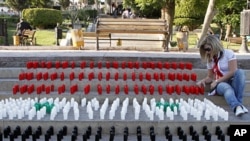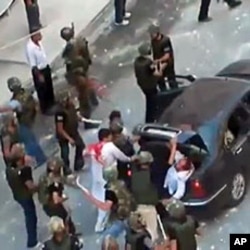The United States on Wednesday imposed sanctions against a Syrian police unit and key Iranian security officials in connection with Syria’s lethal crackdown on protestors. U.S. officials accuse Iran of providing material support for Syrian repression.
The sanctions announced by the Treasury Department add to a growing list of Syrian and Iranian individuals and entities targeted by the United States, including Syrian President Bashar al-Assad and members of his inner circle.
Those cited Wednesday for engaging in human rights abuses include the Syrian Political Security Directorate - one of four branches of the Syrian security forces - and the head of Syrian Air Force Intelligence, Major General Jamil Hassan.
Also designated, for providing support for human rights abuses, were the chief of Iran’s Law Enforcement Forces, Ismail Ahmadi Moghadam, and his deputy, Ahmad-Reza Radan - who is said to have traveled to Damascus in April to aid the Syrian crackdown.
The Treasury Department said agents of the Syrian political security unit opened fire and killed demonstrators in specific incidents in March in the town of Dar’a and in April in Nawa.
The U.S. sanctions freeze any assets those designated might have in the United States and forbid any dealings with them by U.S. citizens or firms.
The immediate effect might be limited, but State Department Deputy Spokesman Mark Toner said the sanctions have wide-ranging implications for those targeted.
“These also limit the ability for other international companies and investors to do business with them as well, so it does have a broad reach,"said Toner. "More importantly, it sends a message that we’re watching these individuals’ actions. And not only watching them, but we’re taking action against them to prohibit any involvement they may have in the U.S. economic system, which as you know reaches worldwide.”
Toner rejected suggestions by Syrian dissident figures and regional analysts that the United States has an overly-optimistic view of the meeting of opposition members that Syrian authorities allowed to be held on Monday in Damascus.
The State Department called the gesture positive and a sign of progress, but several expatriate members of the Syrian opposition dismissed it as a media exercise to draw attention away from continued violence against street protestors.
Syria expert Andrew Tabler of The Washington Institute for Near East Policy also called it a diversion.
“It’s just a way to deflect pressure. We still haven’t seen the regime make any moves," said Tabler. "I mean talking with the opposition in the country who they like, and not talking with the opposition which is driving the protests on the ground, is just not adequate for solving this problem.”
The State Department’s Mark Toner said no one in the Obama administration views the situation in Syria with undue optimism.
“I don’t think anyone has donned rose-colored glasses when they’re looking at the prospects for Assad’s regime to enact meaningful reform," said Toner. "We did, I think, talk about the opposition meeting as a constructive step. But obviously, the regime needs to do a lot more, including allowing peaceful protestors to demonstrate and not firing on innocent protestors.”
The State Department says U.S. Ambassador to Syria Robert Ford has been able to deliver messages to senior Syrian officials in recent days, criticizing their tactics, after having been denied such access for several weeks.
Watch VOA interview with Human Rights Watch official Joe Stork on Syria's human rights record





